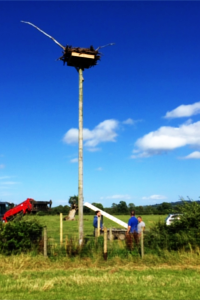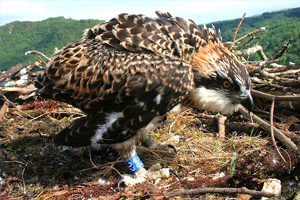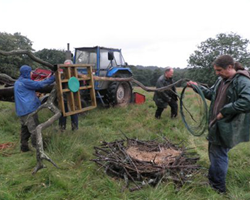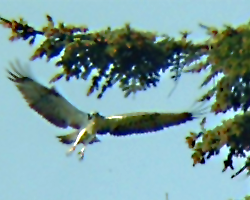 |
Volunteers
|

"Friends of the Ospreys" volunteers, led by a core group, including
Darren Moore, Lenny Watson, Mel Griffith and Drew Murray,
have built 9 nests on the Glaslyn Estuary and several
more at other sites in North and Mid Wales. Many more nests are planned
for the near future throughout Wales and England.
We build a variety of different nest-types, some in tall trees and
others, where no suitable trees are available, atop 10m + utility
poles. Some pole-nests are erected within the branches of stunted oak
or scrub woodland, with the nests protruding through the canopy. We
always fit our pole-nests with natural, antlered, heart of oak perches.
We have had several failed breeding attempts at our nests over
the years, but success finally came in 2012, with 1 young male bird
fledged. This was a fantastic outcome, as the parent birds were
inexperienced 1st time breeders and they succeeded despite prolonged
and atrocious weather conditions from egg-laying through till fledging.
So cold and wet was the weather during the summer of 2012 that
many, more experienced, UK Ospreys failed to rear any chicks at all.
We hope that 2013 will be even more successful for our new breeding
pair and also for other pairs of Ospreys which have visited our nests
in 2012.

Our nests are fitted with sophisticated surveillance devices,
and protected around the clock by numerous dedicated and committed
individuals.
Ospreys are the only avian predator in the world to be solely
reliant upon a diet of fish. As such they are an 'indicator species',
in that any problems in a region's waterways will be first noticed in
the local Osprey population.
It was the low productivity of the 1960's North American Osprey
populations which first alerted the authorities as to the toxic effects
of the agricultural insecticide DDT on the environment.
As a result, new legislation was introduced, banning the use
of this pesticide and Osprey populations eventually recovered. Ospreys
are a sign of a healthy environment, and their presence should be
encouraged by both conservationists and fishermen. Ospreys do not have
a negative impact on fish stocks.
FOO hope to assist in raising the status of UK Ospreys to
their pre-persecution days, and for them to become a common UK breeding
bird once more. We work closely with Roy Dennis, The Rutland Osprey
Project, and Rolf Wahl of the French Osprey Project.



 "Friends of the Ospreys" volunteers, led by a core group, including
Darren Moore, Lenny Watson, Mel Griffith and Drew Murray,
have built 9 nests on the Glaslyn Estuary and several
more at other sites in North and Mid Wales. Many more nests are planned
for the near future throughout Wales and England.
"Friends of the Ospreys" volunteers, led by a core group, including
Darren Moore, Lenny Watson, Mel Griffith and Drew Murray,
have built 9 nests on the Glaslyn Estuary and several
more at other sites in North and Mid Wales. Many more nests are planned
for the near future throughout Wales and England.  Our nests are fitted with sophisticated surveillance devices,
and protected around the clock by numerous dedicated and committed
individuals.
Our nests are fitted with sophisticated surveillance devices,
and protected around the clock by numerous dedicated and committed
individuals.